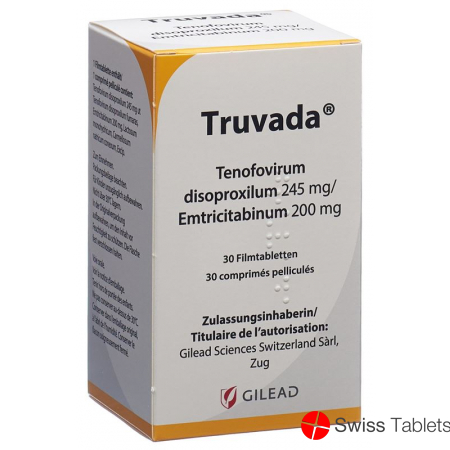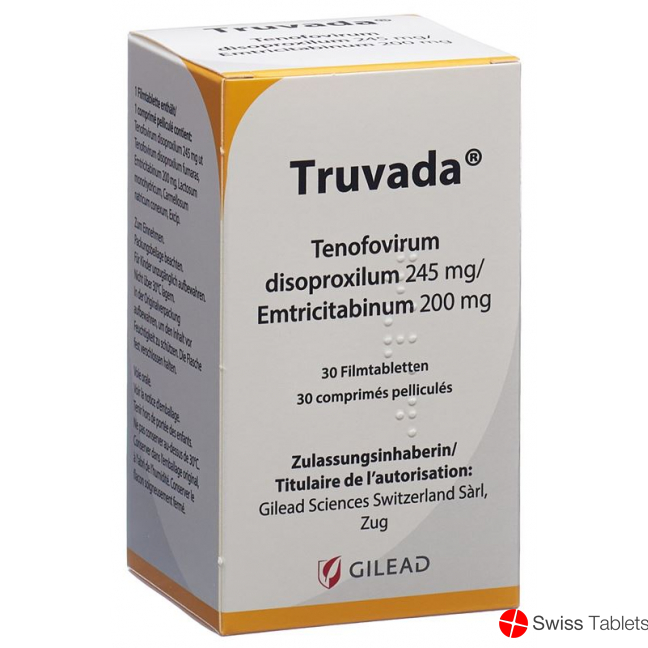Truvada 245 mg / 200 mg 30 tablets
Truvada Filmtabl 245mg/200mg Ds 30 Stk
-
870.88 CHF
- Price in reward points: 3131

- Availability: In stock
- Brand: GILEAD SCIENCES SARL
- Product Code: 3164883
- ATC-code J05AR03
- EAN 7680573160016
Ingredients:
Tenofovir disoproxil, tenofovir disoproxil fumarate, emtricitabine, magnesium stearate, triacetin, lactose monohydrate, titanium dioxide (E171), indigo carmine (E132), sodium, croscarmellose sodium, cellulose microcrystalline, starch pregelatinized

Description
What is Truvada and when is it used?
Truvada contains emtricitabine and tenofovir disoproxil, two antiretroviral drugs.
Emtricitabine is a nucleoside reverse transcriptase inhibitor and tenofovir is a nucleotide reverse transcriptase inhibitor. Both antiretroviral drugs are commonly referred to as NRTIs and interfere with the normal activity of an enzyme (reverse transcriptase) that is necessary for the virus to multiply.
Truvada is used to treat human immunodeficiency virus 1 (HIV) infection in adults.
Truvada is also used to reduce the risk of HIV infection in adults. It is taken daily and used in conjunction with safer sex practices: see "When should you be careful when taking Truvada?" for a list of precautions against HIV infection.
You can only get Truvada with a prescription from your doctor.
What should be taken into account?
HIV-positive people can still pass HIV on to others while taking this medicine, although the risk is reduced with effective antiretroviral therapy. Talk to your doctor about the precautions you need to take to avoid infecting other people.
This medicine is not a cure for HIV infection. You may still get infections or other HIV-related illnesses while taking Truvada. Your doctor will monitor you for this.
Before you take Truvada, to reduce the risk of getting HIV:
Truvada can only help reduce your risk of getting HIV before you become infected.
- You must be HIV negative before starting treatment with Truvada to reduce the risk of acquiring HIV . You must be tested to make sure you do not already have HIV infection. You must only use Truvada to reduce your risk of infection if it is confirmed that you are HIV negative. People who already have HIV must use Truvada in combination with other medicines.
- Many HIV tests cannot detect recent infection. If you have flu-like symptoms, it could mean that you have recently been infected with HIV.
The following symptoms could be signs of HIV infection:
- fatigue
- Fever
- joint or muscle pain
- Headache
- vomiting or diarrhea
- rash
- night sweats
- Enlarged lymph nodes in the neck or groin area
→ Tell your doctor about any flu-like symptoms – whether they occurred within the month before you started taking Truvada or at any time while you are taking Truvada.
When should Truvada not be taken?
Truvada must not be taken
- if you are allergic (hypersensitive) to emtricitabine, tenofovir, tenofovir disoproxil or any of the other ingredients of this medicine.
- if you have severe kidney problems or are on dialysis.
When should caution be exercised when taking Truvada?
It is very important to tell your doctor if you have or have had liver or kidney disease, or if you have abnormal blood or urine test results that indicate problems with your liver or kidneys.
Truvada may affect your kidneys or lower the amount of phosphate in your blood. Your doctor will order some blood tests to check your kidney function. Depending on the results of these tests, your doctor may tell you to take Truvada less often or to stop your treatment with Truvada.
Tell your doctor if you have or have had liver disease, including hepatitis. HIV-infected patients with liver disease such as chronic hepatitis B or C who are receiving antiretroviral medicines have an increased risk of serious, possibly fatal liver complications. If you have hepatitis B infection, your doctor will prescribe the most appropriate treatment for you. If you have or have had liver disease or chronic hepatitis B infection, your doctor may do blood tests to carefully monitor liver function.
The use and safety of Truvada in children and adolescents under 18 years of age has not yet been tested.
Truvada has not been studied in patients over 65 years of age and should be used with caution in these patients.
If you have advanced HIV infection (AIDS) and an existing infection, you may experience symptoms of infection and inflammation when you start treatment with Truvada, or symptoms of a pre-existing infection may worsen. Such symptoms may indicate that your body's improved immune system is fighting off the infection. After you start treatment with Truvada, watch for signs of inflammation or infection. Tell your doctor immediately if you notice any signs of inflammation or infection.
In addition to the associated infections, autoimmune diseases (a condition in which the immune system attacks healthy body tissue) may also occur after you start taking medicines to treat your HIV infection. Autoimmune diseases may occur many months after you start treatment. If you notice any signs of infection or other symptoms such as muscle weakness, weakness that begins in the hands and feet and spreads to the trunk, palpitations, tremors or hyperactivity, please inform your doctor immediately in order to receive the necessary treatment.
Bone disorders. Some adult HIV-infected patients receiving combination antiretroviral treatment may develop a bone disorder called osteonecrosis (death of bone tissue due to insufficient blood supply to the bone). Many risk factors for developing this disorder may include the duration of combination antiretroviral treatment, use of corticosteroids, alcohol consumption, severe suppression of the immune system, or a higher body mass index (a measure of body weight in relation to height). Signs of osteonecrosis include joint stiffness, aches and pains (especially in the hip, knee and shoulder) and difficulty in moving. If you notice any of these symptoms, please talk to your doctor.
Bone problems (which manifest as persistent or worsening bone pain and sometimes lead to bone fractures) may also occur as a result of damage to the cells of the kidney tubules (see also "What are the possible side effects of Truvada?"). Tell your doctor if you experience bone pain or bone fractures.
Tenofovir disoproxil fumarate may also cause loss of bone mass. The most pronounced loss of bone mass was observed in clinical trials when patients were treated with tenofovir disoproxil fumarate in combination with a boosted protease inhibitor. Overall, the effects of tenofovir disoproxil fumarate on long-term bone health and future risk of bone fractures in adult patients are not clear.
Tell your doctor if you know you have osteoporosis. Patients with osteoporosis are at higher risk of bone fractures.
To reduce your risk of getting HIV while you are taking Truvada:
- To reduce your risk , take Truvada every day, not just when you think you are at risk for HIV infection. Do not skip doses of Truvada or stop taking it. Missing doses could increase your risk of getting HIV.
- Get tested for HIV regularly.
- If you think you have been infected with HIV, tell your doctor immediately. They may do additional tests to make sure you are still HIV negative.
Taking Truvada alone may not prevent you from getting HIV .
- Always practice safe sex. Use condoms to reduce contact with semen, vaginal fluids or blood.
- Do not share personal items that may have blood or bodily fluids on them, such as toothbrushes and razor blades.
- Needles or other injection or drug equipment must not be shared or reused with other people.
- Get tested for other sexually transmitted infections such as syphilis and gonorrhea. These infections make it easier to contract HIV.
If you have any further questions about how to prevent getting HIV or passing it on to others, ask your doctor.
Taking Truvada with other medicines
Do not take Truvada if you are already taking other medicines containing emtricitabine, tenofovir disoproxil, tenofovir alafenamide, lamivudine, or adefovir dipivoxil.
It is important to tell your doctor if you are taking other medicines that may damage your kidneys. These include:
- Aminoglycosides, pentamidine or vancomycin (for bacterial infections)
- Amphotericin B (for fungal infections)
- Foscarnet, ganciclovir or cidofovir (for viral infections)
- Interleukin-2 (for cancer treatment)
- Tacrolimus (to suppress the immune system)
- non-steroidal anti-inflammatory drugs (NSAIDs, used to relieve bone or muscle pain)
If simultaneous use is unavoidable, your doctor will check your kidney function once a week. Inform your doctor if you are taking such medicines.
Also tell your doctor if you are taking certain blood pressure medications (ACE inhibitors).
Taking Truvada at the same time as other antiretroviral medicines containing didanosine may increase the blood level of didanosine and reduce the CD4 cell count. Rare cases of inflammation of the pancreas and lactic acidosis (excess lactic acid in the blood), sometimes fatal, have been reported with the concomitant use of medicines containing tenofovir disoproxil and didanosine. Your doctor will carefully consider whether you should be treated with tenofovir disoproxil and didanosine in combination.
It is also important that you tell your doctor if you are taking ledipasvir/sofosbuvir, sofosbuvir/velpatasvir or sofosbuvir/velpatasvir/voxilaprevir to treat hepatitis C infection.
sodium
Truvada contains less than 1 mmol sodium (23 mg) per tablet, which means Truvada is essentially “sodium-free”.
Lactose
Truvada contains 96 mg lactose monohydrate. Please only take Truvada after consulting your doctor if you have been told that you have an intolerance to some sugars.
Ability to drive and operate machinery
This medicine may impair your ability to react, drive and use tools or machines!
Tell your doctor or pharmacist if you
- suffer from other diseases,
- have allergies or
- take other medicines (including those purchased yourself)!
Can Truvada be taken during pregnancy or while breastfeeding?
During pregnancy, you should ask your doctor for advice before taking any medicine.
Truvada should not be used during pregnancy unless your doctor has specifically prescribed it. Although there is limited clinical data on the use of Truvada during pregnancy, it is not usually used unless absolutely necessary. Women of childbearing potential must use effective contraception to avoid pregnancy during treatment with Truvada. Ask your doctor which method is suitable for you.
If you have taken Truvada during pregnancy, your doctor may ask you to have regular blood tests and other diagnostic tests to monitor your baby's development.
You must not breastfeed during treatment with Truvada. Both the HIV virus and the active ingredients in Truvada can pass into breast milk and cause serious harm to your baby.
How do you use Truvada?
Always take Truvada exactly as your doctor has told you to ensure that Truvada gets the most out of your medication and to reduce the risk of developing resistance to treatment.
The usual dose of Truvada for treating HIV or reducing the risk of getting HIV is one Truvada tablet once daily with a meal.
If you have kidney problems, your doctor may advise you to stop taking Truvada or, if you already have HIV, prescribe a different dosing schedule.
If you have difficulty swallowing, you can crush the tablet in about 100 ml (half a glass) of water, orange juice or grape juice, using the tip of a spoon to speed up the dissolution of the tablet. Then stir and drink the glass immediately.
For the treatment of HIV infection, your doctor will only prescribe Truvada in combination with other antiretroviral medicines. Please read the patient information for the other antiretroviral medicines to learn how to use these medicines.
If you are being treated for HIV infection and your doctor decides to stop treatment with one of the active ingredients of Truvada or to change the dose of Truvada, he or she may prescribe emtricitabine and/or tenofovir alone or in combination with other medicines to treat your HIV infection.
If you are taking Truvada to reduce your risk of getting HIV, take Truvada every day, not just when you think you may be at risk of getting HIV.
If you have any questions about how to prevent getting HIV or passing it on to others, ask your doctor.
Do not change the prescribed dosage on your own. If you think the medicine is too weak or too strong, talk to your doctor or pharmacist.
children and adolescents
The use and safety of Truvada in children and adolescents under 18 years of age has not yet been established. Truvada should not be used in these patients.
If you vomit after taking Truvada
Truvada is absorbed quickly by the body. If you vomit less than 1 hour after taking Truvada, you need to take another tablet. You do not need to take another tablet if you vomit more than 1 hour after taking Truvada.
If you take more Truvada than you should
If you accidentally take too many Truvada tablets, contact your doctor or go to the nearest emergency room. Take the tablet bottle with you so it is easier to write down what you have taken.
If you forget to take Truvada
It is important that you do not miss a dose of Truvada.
If you miss a dose of Truvada, take it as soon as possible and then take your next dose at the usual time.
If it is almost time for your next dose, do not take a missed dose. Wait and take the next dose at the usual time. Do not take a double dose to make up for a forgotten dose.
If you stop taking Truvada
Do not stop taking Truvada without talking to your doctor. If you stop taking Truvada for HIV, the HIV treatment prescribed by your doctor may not be as effective. Talk to your doctor before you stop taking Truvada for any reason, especially if you are experiencing a side effect or have another illness. Contact your doctor before you start taking Truvada again. If you have problems or your dose needs to be adjusted, your doctor may prescribe the ingredients of Truvada separately.
If you are taking Truvada to reduce your risk of getting HIV, do not stop taking Truvada or miss a dose. Stopping Truvada or missing doses could increase your risk of getting HIV.
Always make sure you have a sufficient supply of Truvada tablets. This is very important for treating HIV infection because the amount of virus can quickly increase again, even if treatment is interrupted for a short time. After that, it may be more difficult to treat the virus.
If you have hepatitis B, it is especially important that you do not stop your treatment with Truvada without first talking to your doctor. In some patients, blood tests or symptoms have shown that hepatitis got worse after stopping emtricitabine or tenofovir disoproxil (the active ingredients in Truvada). You may need blood tests to check your liver function for several months after treatment has stopped. In some patients with advanced liver disease or cirrhosis, stopping treatment is not recommended as it may cause hepatitis to get worse. Tell your doctor straight away about any new or unusual symptoms you notice after stopping treatment, especially any symptoms you think are related to hepatitis B infection.
What side effects can Truvada have?
During HIV treatment, weight gain and an increase in blood fats and blood sugar levels may occur. This is partly related to the improved health and lifestyle; in the case of blood fats, sometimes to the HIV drugs themselves. Your doctor will examine you for these changes.
The following side effects may occur when taking Truvada:
Very common (affects more than 1 in 10 users)
Dizziness, headache, diarrhea, nausea, vomiting. In addition, laboratory tests may show decreased phosphate levels and/or increased creatine kinase levels in the blood. Increased creatine kinase levels may be associated with muscle pain and weakness.
Common (affects 1 to 10 users in 100)
Allergic reactions, difficulty sleeping, unusual dreams, flatulence, digestive problems leading to discomfort after meals, abdominal pain, skin rashes (including red spots or patches, sometimes with blisters and swelling of the skin) which may be allergic reactions, itching, changes in skin colour including dark spots, pain, feeling weak, problems with the liver and pancreas.
Laboratory tests may also reveal the following findings:
low white blood cell count (can make you susceptible to infections), increased triglyceride (fatty acids), bilirubin (bile pigment) or sugar levels in the blood.
Occasionally (affects 1 to 10 users in 1000)
Anemia (low red blood cell count).
Rare (affects 1 to 10 in 10,000 users)
Excess lactic acid in the blood (lactic acidosis): Lactic acidosis is a serious side effect that can be fatal. Deep, rapid breathing, dizziness, and general symptoms such as nausea, vomiting, and abdominal pain may indicate the development of lactic acidosis. Contact your doctor immediately if you think you have lactic acidosis.
Upper abdominal pain due to inflammation of the pancreas, changes in urine, and back pain caused by kidney problems such as kidney failure or damage to the cells of the renal tubules.
Laboratory tests may also reveal elevated levels of creatinine in the blood.
Very rare (affects less than 1 in 10,000 users)
Shortness of breath, yellowish skin or eyes, itching, pain in the upper abdomen due to inflammation of the liver, acute damage to the cells of the renal tubules.
Other possible side effects
Swelling of the face, lips, tongue or throat, fatty liver, inflammation of the kidneys, passing large amounts of urine and feeling thirsty. Damage to the cells of the kidney tubules may cause back pain, muscle pain, muscle weakness, muscle breakdown, softening of the bones (with bone pain and sometimes resulting in bone fractures) and a decrease in the concentration of potassium or phosphate in the blood.
Children taking emtricitabine, one of the active ingredients in Truvada, also commonly experienced anaemia (low red blood cell count) and very commonly changes in skin colour including dark spots. If red blood cell production is reduced, a child may have symptoms such as tiredness or shortness of breath.
Tell your doctor if you notice any of these side effects.
If you notice any side effects, please contact your doctor or pharmacist. This applies in particular to side effects not listed in this leaflet.
What else should be considered?
This medicine should only be used until the date stated on the container with “EXP”.
storage instructions
Keep out of reach of children.
Do not store above 30°C.
Store in the original packaging to protect the contents from moisture.
Keep the bottle tightly closed.
The bottle has a child-resistant cap and contains a desiccant.
Return any medicines you no longer need to your pharmacy for disposal.
Further information
Your doctor or pharmacist will be able to provide you with further information. These people have the detailed specialist information.
What is in Truvada?
1 film-coated tablet contains:
active ingredients
200 mg emtricitabine and 245 mg tenofovir disoproxil (as fumarate).
excipients
Tablet core: croscarmellose sodium, lactose monohydrate, magnesium stearate (E572), microcrystalline cellulose (E460), pregelatinized starch (gluten-free).
Tablet film: triacetin (E1518), hypromellose (E464), indigo carmine aluminum salt (E132), lactose monohydrate, titanium dioxide (E171).
registration number
57316 (Swissmedic)
Where can you get Truvada? What packs are available?
In pharmacies against a doctor's prescription, which entitles you to a one-time purchase only.
Packs of 1x 30 film-coated tablets.
marketing authorization holder
Gilead Sciences Switzerland Sàrl, Zug.
Reviews (0)

Free consultation with an experienced pharmacist
Describe the symptoms or the right drug - we will help you choose its dosage or analogue, place an order with home delivery or just consult.
We are 14 pharmacists and 0 bots. We will always be in touch with you and will be able to communicate at any time.











